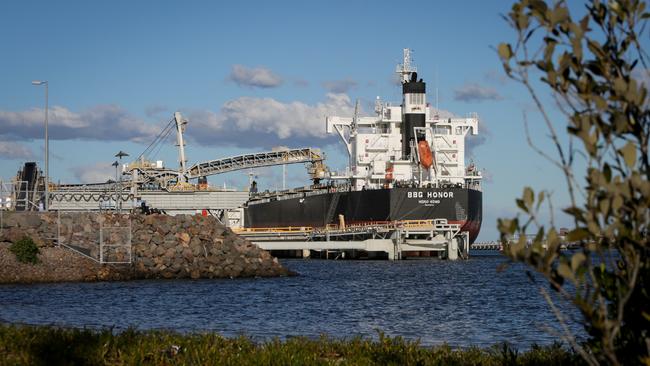The Port of Newcastle’s complicated debt dance

The cost will be stupendously large – some estimates say 1.5 per cent of global GDP, and that’s an annual figure; not a one-off.
Inevitably, people will be displaced and assets will be stranded, no longer able to attract financial support.
The port’s heavy reliance on coal in the $25bn of annual trade it facilitates means that the long-term future of the country’s biggest east-coast terminal is by no means assured.
Those are the simple facts, which is why the asinine contributions of politicians like NSW Nationals senator Perin Davey should be ignored.
When Davey told this newspaper that the growing “propensity of Australian financial institutions to prioritise climate risk-based financing practices over reasonable and legal business” was against the national interest, she was doing little more than creating false hope.
The hope, at best, would be some kind of appeal to the patriotic soul of the banking industry; at worst, it would be taxpayer funding of pet fossil-fuel projects that the commercial banks won’t touch with a barge pole.
If Davey wants to rail against the system, perhaps she should go global and target the world’s biggest investor, BlackRock.
Chief executive Larry Fink warned 1000 global chief executives of carbon-intensive companies last month that they risked being dumped by BlackRock if they made “insufficient preparation for the net zero transition”.
If a $900m debt rollover sounds big, you should try on BlackRock’s $US8.67 trillion ($11.2 trillion) in assets under management for size.
That’s 8 per cent or so of the circa-$US100 trillion in global funds under management.
It seems to this column that ANZ Bank Shayne Elliott and his Big Four bank counterparts might take a little more notice of Fink’s view on global capital flows than the likes of Davey.
It would make even more sense, knowing that BlackRock is a brooding presence on each of their share registers.
In the second half of last year, Elliott said that the bank had started discussions in 2018 with 100 of its highest-emitting customers, encouraging them to establish or strengthen low-carbon transition plans by 2021.
He warned there would be “massive concerns about the viability” of any businesses that were dismissive of the climate challenge.
“We’d move to exit that customer, and the reason is it’s a red flag about good, old-fashioned risk management,” the ANZ boss said.
The bank declined to comment on Tuesday in relation to its dealings with the port of Newcastle.
The port, however, has not been sitting on its laurels, content to rely on the goodwill of its banks.
It knows that its dependence on coal, in particular thermal coal, enhances its vulnerability to the shifting tectonic plates of global finance.
The proposed $1.8bn construction of a container terminal would help diversify the business, but first it needs a court judgment to remove operational constraints imposed by the NSW Government as part of its 2014 privatisation.
In the meantime, coal’s dominance of the port’s cargo has become entrenched, mushrooming from 69m tonnes of exports in 2000 to almost 160m tonnes in 2020.
There’s such a thing as too much success.
Late last year, the port huddled with its bankers about a refinancing deal.
Reportedly, the financing arm had $888m in external loans at December 31, including a fully-drawn, $515m tranche due to mature in July 2021 and a further $343m payable in July 2023.
There were also capital and working facilities.
The banking syndicate included ANZ, National Australia Bank, Commonwealth Bank, and some Chinese banks backing part-owner China Merchants.
Thankfully for the port, it was able to convince NAB to fill the breach after ANZ decided to exit.
Newcastle should not feel singled out by ANZ – this column has previously reported that the bank has dropped out of half a dozen lending relationships with large fossil fuel-based companies over the last two years.
For example, ANZ stumped up for Whitehaven Coal’s refinancing in 2017 but wasn’t part of the pure-play coal company’s latest $1bn package announced last year.
Coal is the most problematic commodity for the banks, in particular thermal coal which is the subject of specific exit deadlines.
The climate policies of the big four are broadly similar, with differences only at the margin, although there is room for interpretation and the exercise of discretion depending on the circumstances.
Appearing on Melbourne radio station 3AW on Tuesday, NAB chief executive Ross McEwan said the port was part of an industry which needed investment to “stay up with its requirements”.
“It needs investment to actually get its emissions down, and we can’t walk away from these businesses,” he said.
“But they are all transitioning to quite a different place over the next 10 years, and you know, this is a prime example.”
But as quickly as you mention coal to bank CEOs, the subject of renewables is not far behind.
It’s the future, after all, and McEwan was no exception, saying NAB was at the forefront of investment in new ways of creating energy.
“We’re one of the largest providers of financing globally in renewable energy,” he said.
“Our call coal (positions) are about $700m but renewable energy is well over $10bn, so it’s a big difference in where we have been putting the investors’ money and where we’ve been lending.
“So that transition is already starting to happen for this bank and for Australia.”



The successful scramble by the Port of Newcastle to refinance about $900m of debt after ANZ Bank bid adieu to its fellow lenders is just the beginning of a wrenching transition in the global economy to net zero emissions by 2050.